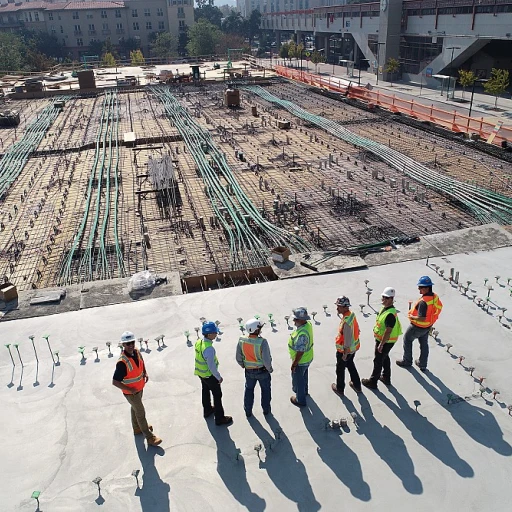
Understanding the Core Responsibilities of an Organizational Manager
Core Responsibilities in Modern HR Systems
In today’s evolving business landscape, the role of organizational managers is pivotal in the efficient functioning of human resources information systems (HRIS). Their responsibilities are multi-faceted and require a deep understanding of both HR mechanisms and technological proficiency. For organizational managers, leading the charge in HRIS involves several key tasks:- Leadership and Vision: Managers must exhibit strong leadership skills to steer their teams through the complexities of HRIS. This involves strategic planning and aligning HR systems with the organizational goals to foster development and innovation.
- Change Management: As custodians of change, managers play a vital role in implementing new HR systems. They must demonstrate resilience and agility in navigating organizational change, ensuring smooth transitions and minimal disruption.
- Skill Development and Training: The integration of advanced HRIS demands continuous education and training. Organizational managers are responsible for orchestrating training development programs that enhance the skills of their teams, equipping them to handle intricate HR processes efficiently.
- Interdisciplinary Collaboration: Effective managers engage in cross-functional collaboration, working closely with departments like data analytics, software engineering, and project management to maximize the capabilities of HRIS.
Navigating the Digital Transformation in HR
Adapting to the Digital Age in HR
In today's rapidly evolving business landscape, successful management is synonymous with digital adaptation. Organizational managers play a crucial role in facilitating and guiding the digital transformation within Human Resources (HR). This involves not only understanding the latest technologies but also seamlessly integrating them into current work processes to enhance efficiency. Navigating the complexities of digital transformation requires a blend of skills and experience in technology, change management, and business administration. Managers are expected to leverage their knowledge in computer systems and software engineering to drive organizational development forward, ensuring that HR processes are streamlined and optimized.Fostering a Culture of Continuous Learning
To keep up with rapid technological advancements, ongoing education and training development programs are crucial. Managers are tasked with identifying and facilitating online programs that can equip HR teams with the necessary job skills to thrive in the digital age. Training not only revolves around understanding new HR software but also involves teaching staff about data analytics and business psychology, empowering them to make informed decisions.Implementing Effective Change Management Strategies
Implementing HRIS can be a significant change for any organization. Therefore, managers need to have robust change management skills to effectively guide teams through this transition. Leadership plays a pivotal role in minimizing resistance to change, fostering a positive outlook on new technologies, and ensuring a smooth transition for all employees involved. Organizational managers should also focus on fostering a culture of flexibility where employees feel confident and competent in using new tools and technologies. This involves regular training and development, as well as continuous feedback loops to address any concerns promptly. To explore more about how organizations are redesigning HR processes, consider looking into Exploring Alternatives to Insperity in HR Information Systems. This link provides insights into alternative solutions that may better suit the unique needs of an organization, thereby supporting effective change and development.Enhancing Employee Engagement through HRIS
Boosting Workforce Engagement through Technological Solutions
Leveraging a Human Resources Information System (HRIS) allows organizational managers to significantly elevate employee engagement levels. These systems provide tools and resources necessary to foster a more dynamic and engaging workplace environment within the organizational framework.- Enhancing Communication: HRIS platforms often come with integrated communication tools, making it easier for managers and employees to share information and collaborate effectively. Improved communication channels enable managers to keep the workforce informed, reducing misunderstandings and fostering a positive work culture.
- Facilitating Professional Development: HRIS can offer modules focused on organizational development and training programs. These features assist managers in identifying skill gaps and facilitating appropriate training and education opportunities, leading to better resource management and job satisfaction.
- Encouraging Self-Service: Modern HR systems incorporate self-service portals that empower employees to manage their personal information, training development, and career progress without constant managerial intervention. This autonomy enhances employee satisfaction and retention while freeing managers to focus on strategic issues.
- Utilizing Data for Organizational Change: The use of analytics in HRIS allows managers to gather insights into employee behavior. By analyzing this data, managers can tailor HR strategies to align with employee needs, supporting both individual and organizational growth. This data-driven approach enables a more personalized and fulfilling employee experience.
Data-Driven Decision Making
Leveraging Data for Strategic Decisions
In today's rapidly evolving business landscape, organizational managers are increasingly reliant on data-driven decision making. This approach is crucial for effectively managing human resources and driving organizational development. By leveraging comprehensive data analytics, managers can gain valuable insights into employee performance, engagement, and overall organizational health.
Data analytics in human resources allows managers to identify trends and patterns that might not be immediately apparent. For instance, analyzing employee turnover rates can help pinpoint areas where organizational change might be necessary. Similarly, understanding employee satisfaction through surveys and feedback can guide development managers in creating more effective training development programs.
Integrating Technology with Human Insight
While data is a powerful tool, the role of human insight cannot be understated. Managers must balance analytical findings with their own leadership skills and experience. This balance ensures that decisions are not only data-driven but also aligned with the organization's culture and goals. Effective change management requires managers to interpret data within the context of their unique organizational environment.
Education and continuous training in data analytics and business psychology are essential for managers to harness the full potential of HRIS. Online programs and workshops can provide the necessary skills and knowledge, enabling managers to make informed decisions that foster organizational growth and employee satisfaction.
Challenges in Data Utilization
Despite the advantages, there are challenges in utilizing data effectively. Managers often face issues related to data quality, integration, and interpretation. Ensuring data accuracy and relevance is critical for making sound decisions. Additionally, managers must be adept at communicating data insights to stakeholders across the organization, a skill that can be developed through targeted training and education programs.
In conclusion, the integration of data-driven decision making into HR practices is an ongoing process that requires commitment to continuous learning and adaptation. As technology and business environments evolve, so too must the strategies employed by organizational managers to leverage data effectively.
Challenges Faced by Organizational Managers in HRIS Implementation
Overcoming Implementation Hurdles
Implementing a human resources information system (HRIS) can be a challenging endeavor for organizational managers who often grapple with multiple obstacles. These challenges primarily stem from the need to adapt to new technologies while ensuring employees are adequately trained and aligned with new processes.
One of the core issues is change management. Introducing new technology invariably requires an organization to embrace change, which may not be readily accepted by all employees. Organizational managers need to possess robust change management skills to navigate these waters effectively, facilitating smooth transitions and minimizing resistance.
Additionally, balancing the technical aspects of a new system with the human element can be daunting. Managers must ensure that development programs and education initiatives are in place to support employees’ learning curves. This involves integrating training development into their strategic plans, providing both in-person and online programs to cater to diverse learning needs.
The skills required include a solid understanding of software engineering fundamentals and data analytics. Managers often need to collaborate closely with IT departments to ensure the system is tailored to the organization’s needs while keeping abreast of technical updates.
Data-driven decision-making is another area where organizational managers must excel. Reliable data extraction and utilization from these systems are imperative to inform strategic business decisions. Training in business analytics and data interpretation is often necessary to harness the full potential of HRIS.
Despite these challenges, the role of an organizational manager is crucial in ensuring the successful implementation and operation of HR systems. Strong leadership, effective project management, and ongoing organizational development initiatives can help overcome these challenges, leading to a more efficient and productive management system.
Future Trends in HRIS and the Role of Organizational Managers
Innovations and Evolving Dynamics in HRIS
As the landscape of Human Resources Information Systems (HRIS) continues to evolve, organizational managers must stay ahead by adapting to the latest trends and technologies. The field of HRIS is increasingly influenced by advancements in data analytics and artificial intelligence, which provide managers with powerful tools to enhance efficiency and decision-making capabilities.
One significant trend is the integration of advanced analytics within HR systems. Managers are now able to leverage data-driven insights to optimize talent management strategies, customize training development programs, and improve overall organizational performance. The development of personalized online programs for employee growth can lead to enhanced job satisfaction and higher retention rates.
Furthermore, the shift towards cloud-based solutions and mobile applications has transformed how managers interact with HRIS. This change necessitates a focus on developing technical skills among managers to effectively navigate these digital platforms. Continuous manager education and training in new technologies are essential to harness the full potential of these systems without disrupting organizational operations.
As we look toward the future, the importance of fostering a culture that embraces change management will be vital. Development managers should emphasize building leadership skills among their teams to adapt to upcoming transformations in HRIS. Organizational change often requires strong leadership and a collaborative approach to ensure a smooth transition.
Moreover, the rise of remote work and decentralized teams highlights the need for tools that support virtual collaboration. HRIS development will continue to focus on features that facilitate effective communication and project management across diverse work environments. Ensuring that managers and employees are well-versed in these capabilities will support seamless organizational development.
In conclusion, as HRIS continues to advance, the role of organizational managers will expand to include a deeper understanding of analytics business and technology integration. Staying informed about the latest trends and continuously developing their skills will be crucial for managers to lead their organizations effectively through this dynamic era.













